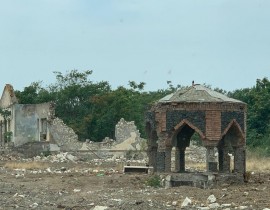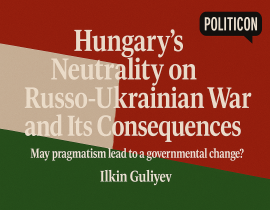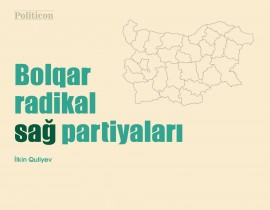Politicon.co
3 reasons why OSCE fails in conflict resolution

The Organization for Security and Co-operation in Europe (OSCE) was once considered a pivotal mediator in regional conflicts across Eurasia. Back then, the 1975 Helsinki Final Act was considered a testament to the post-WWII world order, celebrating the eternal freedoms and irrevocable essence of the rights granted to the States and peoples.
However, the OSCE’s track record in addressing the conflicts reveals critical flaws in its approach. Despite decades of mediation, OSCE efforts were marred by inefficiency, bias, outdated practices, and a lack of contextual understanding. This article examines the reasons behind Azerbaijan’s perception of OSCE’s failure in the conflict-resolution, detailing how these shortcomings prevented the Organisation from delivering meaningful outcomes.
Predominance of Bias, Double Standards and National Agendas
One of the most pronounced issues with the OSCE is the Organisation’s perceived bias and application of double standards, which undermined fair and balanced conflict mediation. For instance, the OSCE Minsk Group, tasked with addressing the Armenia-Azerbaijan conflict, was co-chaired by Russia, the United States, and France. Azerbaijan often viewed the Minsk Group as disproportionately influenced by the political agendas of its co-chairs, rather than acting as an impartial coalition dedicated to resolution. This perception was further intensified by the Minsk Group’s inability to hold Armenia accountable for ceasefire violations, seen by many in Azerbaijan as a tacit endorsement of Armenia’s actions.
Such perceived inequitable treatment diminished Azerbaijan’s confidence in the OSCE’s neutrality, undermining its effectiveness as a mediator. In contrast, comparable conflicts in other regions often received more direct and decisive intervention, reinforcing the belief that double standards had become ingrained in the OSCE’s approach.
Over the years, Azerbaijan had been continuously highlighting the influence of national agendas within the OSCE Minsk Group as a critical obstacle to effective conflict resolution. The Minsk Group’s co-chairs were seen as prioritising their respective geopolitical interests over an impartial, actionable resolution. This politicisation of the Minsk Group’s mandate frustrated Azerbaijan, which felt that the OSCE had missed opportunities to mediate in a truly neutral capacity.
Limited Monitoring and Accountability Mechanisms. Financial Management Issues
OSCE’s limited monitoring and accountability mechanisms deem inadequate in ensuring adherence to ceasefire agreements. Despite a substantial budget, the OSCE struggled to establish comprehensive and transparent reporting on ceasefire violations. Instead, the Organisation relied on limited and sporadic monitoring that failed to capture the scope of infractions on the ground. The Special Monitoring Mission of the Organization left Ukraine on March 31, 2022 without any result after 8 years, which also seriously damaged its trustworthiness.
The deadlock over the Chairperson-in-Office (CiO) position, with Russia blocking Estonia’s candidacy, highlighted OSCE’s internal struggles. Such dysfunction raised doubts about the Organisation’s reliability, leaving Azerbaijan and other member states questioning its ability to effectively address and manage conflicts within its framework. Unfortunately, the OSCE’s failure to release its annual reports since 2021, alongside operational hurdles exacerbated this inconsistency.
These limitations were compounded by the OSCE’s inability to agree on a unified budget, forcing it to operate on monthly allotments that restricted consistent funding. Such bureaucratic gridlock not only obstructed the peacekeeping efforts but also led some of the member States to view OSCE’s presence in conflict zones as largely symbolic, with limited tangible outcomes. The Organization’s financial management can be viewed as emblematic of broader inefficiencies - instead of directing funds towards practical conflict resolution, resources were largely channelled into administrative expenses and bureaucratic upkeep.
All these factors deepened general scepticism regarding the OSCE’s priorities, as rising operational costs appeared to have little correlation with tangible outcomes. The OSCE funds should have prioritised relief and actionable peacebuilding, rather than supporting a bureaucratic structure detached from the real needs of those impacted by conflict.
The One-Size-Fits-All Approach and Outdated Rhetoric
Another point of contention is the OSCE’s tendency to apply a one-size-fits-all approach, disregarding the specific aspects of every conflict. The South Caucasus presents a complex socio-political landscape requiring nuanced, culturally informed solutions. However, OSCE strategies often lacked sensitivity to these local dynamics, resulting in impractical proposals that failed to resonate with the realities on the ground.
This generic approach contributes to the sense that the OSCE lacks genuine commitment to understanding regional dynamics. For Azerbaijan, effective conflict resolution demanded tailored approaches - a flexibility the OSCE failed to demonstrate, thereby undermining its credibility as a mediator.
Azerbaijan also pointed to the OSCE’s reliance on outdated frameworks as evidence of the Organisation’s inability to adapt to modern geopolitical realities. Significant shifts in the South Caucasus over the past decade demanded optimised approaches. However, the OSCE maintained an approach rooted in language and concepts which were becoming increasingly irrelevant. Rather than acknowledging the evolving geopolitical landscape, the OSCE’s steps contributed to its perception as a stagnant, detached institution.
As can be seen, Azerbaijan’s criticisms of the OSCE stem from a perception that the Organisation fell short of delivering justice, accountability, and effective conflict resolution during the Armenia-Azerbaijan conflict. Issues of double standards, financial inefficiencies, outdated frameworks, and political agendas within the Minsk Group painted a picture of an Organisation more invested in its own bureaucratic maintenance than in fostering genuine peace.
For the OSCE to regain credibility, it would need to embrace a more adaptive, contextually sensitive approach, streamline its budget for practical peacebuilding, and prioritise its own transparency. Without these reforms, Azerbaijan and other nations affected by conflicts will continue to view the OSCE as an Organisation offering symbolic gestures rather than substantial geopolitical solutions for the Eurasian region.
![]()
- TOPICS :
- Conflict and peace
- REGIONS :
- Russia and CIS





png-1748065971.png)



jpg-1599133320.jpg)

